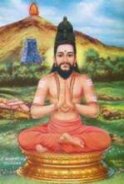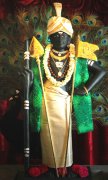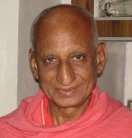

THE ESOTERIC
KANDAR ANUBHUTI
OR
THE SECRET TEACHING ON
GOD-EXPERIENCE
(A Treatise on Adwaitic Realization)
OF
SAINT ARUNAGIRINATHAR

 |  THE ESOTERIC KANDAR ANUBHUTI OR THE SECRET TEACHING ON GOD-EXPERIENCE (A Treatise on Adwaitic Realization) OF SAINT ARUNAGIRINATHAR |  |
 | by N.V. Karthikeyan |  |
| verses contents intro 1 2 3 4 5 6 7 8 9 .. 11 this verse in PDF version (4 parts) p-1 p-2 p-3 p-4 complete download of this book |
VERSE-1 ஆடும் பரிவேல் அணிசேவல் எனப் பாடும் பணியே பணியாய் அருள்வாய் தேடும் கயமா முகனைச் செருவில் சாடும் தனியானை சகோதரனே.Aadum parivel ani seval enap Paadum paniye paniyaai arulvaai Thedum kayamaa mukanai cheruvil Saadum thani yaanai sahotharane. The dancing Peacock, Vel, and the beautiful Cock -- Commentary The work Kandar Anubhuti commences with this verse and the verse begins with the word "aadum" which contains 'A', 'U', and 'M', meaning "AUM/OM." Thus, the work commences with the auspicious 'OM' or Pranava, the most sacred Mantra. And the first-line "aadum pari vel aniseval" has in it hidden the great Mantra in Tamil, "OM Velum Mayilum Thunai," which means "The Vel and the Peacock are (my) protection or support." The prayer is for the blessedness of constantly repeating this great mantra, "Om Velum Mayilum Thunai", or any Mantra for the matter of that. The Peacock, in its dancing pose, symbolises OM. Vel stands for Supreme Knowledge. The Cock announces in the early hours of dawn the advent of light or sun, and the divine Cock on the banner of the Lord indicates the advent of Wisdom, Jnana-Surya. In that alerted condition of crowing, the cock looks more beautiful than otherwise, hence Arunagirinathar says, "the beautiful cock." It is interesting to note that the adjectives "dancing" and "beautiful" have been added to the peacock and cock, respectively, but nothing to the Vel. Because the Vel, which is pure Knowledge and identical with the Lord Himself, stands not in need of any adjectives; it gives value for everything and nothing can add to its glory. In some of the verses, the Vel is referred to as the "Sharp-Vel," "Incomparable-Vel," "Victory-Vel," etc., but they are not adjectives to the Vel; they only denote that particular aspect of the Vel which is invoked, according to the context in the respective verses. 'Gaja' means elephant, and 'mukha' means face. Gaja-mukha was an Asura with an elephant's face. He had obtained boons of non-destruction by any astra or sastra (weapons), from Lord Siva. His only work was to trouble the Devas in Svarga. He sought after them and attacked them. The Devas represented their condition before Lord Siva and sought His help to kill the Asura. Under instructions from Lord Siva, Lord Ganesa, who too has an elephant's face, engaged the Gajamukha Asura in battle and killed him, a job which none else could do. Hence He is addressed as the 'Peerless Ganesa'. Since the work 'Kandar Anubhuti' is a 'treatise' on Anubhuti or God-realisation, it is all practice from the very beginning, because mere philosophising will lead one nowhere. Hence, an introduction into a life of Sadhana is made in the first verse itself, by way of taking to a systematic practice of Japa or Naama-smarana (repetition of the Lord's Name and singing His glories). We have seen that "Aadum Pari Vel ani Seval" contains the Mantra 'Om Velum Mayilum Thunai', and the Sadhaka prays that he be blessed with the sole task of constantly singing this (or any) Mantra, His glories and chanting His Names, -- Paadum Paniye Paniyaai Arulvaai. This clearly implies that the treatise is primarily meant for whole-souled aspirants or seekers who are dedicated to the practice of Sadhana to seek and attain God. When does this holy wish to seek God arise in one's life? It is a mystery! அவன் அருளால் அவன் தாள் வணங்கி 'Avan Arulaal Avan Thaal Vanangi' -- "By His grace, one resorts to, or worships, His Feet." The 'Avadhuta Gita' says: 'Ishwara Anugrahaat eva pumsaam Adwaita Vaasana' - "Only by the grace of Ishwara (God) that an aspiration to realise God arises in a person." When one has seen through life, its pleasures, pains and vicissitudes; when one has had enough of this world; when one gets fed up with the vain pursuit of pleasure and wealth which ends in sorrow; he feels that there is nothing worth achieving here. Everything here is passing and perishable. What he needs is something lasting, but does not know what it is and how to achieve it. He is whole-heartedly looking for it. It is then that the grace of God comes to his rescue and his mind is turned towards God in some mysterious manner. It may be a critical moment, a crisis or calamity in his life, a scripture that comes into his hands by chance, a Satsanga or spiritual discourse he is taken to willy-nilly, a word from an elder or a child, or anything for the matter of that, which makes him realise that everlasting happiness can be found only in God and resort to God is the only way. Thus his mind is turned towards God in a mysterious manner. It is for such aspiring souls that this scripture, the Kandar Anubhuti, is primarily meant, not for those to whom this world is still a pleasure-garden. (Important Note: 'Paadum paniye paniyaai arulvaai' -- "Grant me the only task of singing God's glories." Who offers this prayer? Is Arunagiri asking this for himself? No. Certainly NOT. Because when Arunagiri, repenting for his wrong deeds, dropped himself from the temple tower, the Lord saved him and commanded him to sing His glories and gave him the first line to start with. Since then Arunagiri's whole life was one of continuous prayer and singing the Lord's glory, -- thousands of Tiruppugazh, Kandar Alankaram, etc., -- till the end of his life. When he gave the Kandar Anubhuti, he was already immersed in the Bliss of God, rather intoxicated with Divine Love. He was already a Jivanmukta, a fully Illumined saint. Hence it would be meaningless to assume that he offers this prayer for himself. It has to be of someone in whose position he places himself and sings. It is the prayer of a Sadhaka who has just been awakened to the purpose of life in a mysterious manner (as stated above) and commences his spiritual life for realising God. This and many of the verses are sung in the first person, so that when we sing them they not only become our prayer but also evoke the needed feeling in us and produce the intended effect/benefit in us. Because the verses are sung in the first person, we should not make the mistake of taking them to be Arunagiri's prayers for himself or that they represent his personal problems or experiences. Thus in no verse does the prayer offered or the condition mentioned or experience revealed refer to Arunagiri himself, i.e., they do not refer to his personal life or experience. They represent the condition/experience of a seeker or Sadhaka; hence the Title: "The Esoteric Kandar Anubhuti". We will do well to remember this point throughout our study of this exposition.) |
| contents intro 1 2 3 4 5 6 7 8 9 .. 11 this verse in PDF version (4 parts) p-1 p-2 p-3 p-4 |
| ... www.kaumaram.com ... The website for Lord Murugan and His Devotees முகப்பு கௌமாரம் அட்டவணை மேலே தேடல் home Kaumaram contents top search |
Kaumaram.com is a non-commercial website. This website is a dedication of Love for Lord Murugan. Please take note that Kaumaram.com DOES NOT solicit any funding, DIRECTLY or INDIRECTLY. |